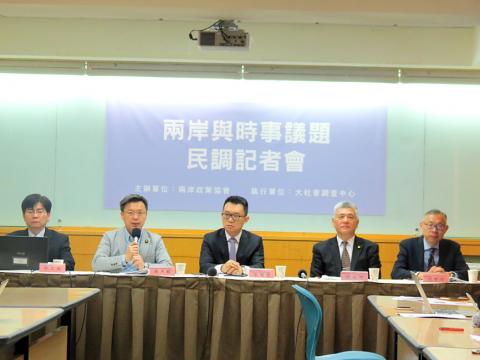Nearly 80 percent of Taiwanese regard Beijing as being hostile to Taiwan since President Tsai Ing-wen’s (蔡英文) inauguration in May last year, a sentiment that appears to transcend political boundaries, according to a survey released by the Cross-Strait Policy Association yesterday.
The poll found that 77.2 percent of respondents think China has been unfriendly to Taiwan since Tsai was sworn in, of which 43.8 percent believe it is “extremely inimical.”
A mere 15.3 percent of those polled considered Beijing as being amiable, while 7.5 percent declined to give an answer.

Photo: courtesy of the Cross-Strait Policy Association
An analysis of the results showed that Beijing’s hostile perception is shared by the public, regardless of their political affiliation, with 89.2 percent, 71.8 percent and 63.7 percent of respondents who identified themselves as pan-green supporters, pan-blue sympathizers and nonpartisan feeling that way respectively.
Conversely, 43.3 percent of respondents said that Tsai has demonstrated “just the right amount” of goodwill toward Beijing, followed by 38.1 percent who think she has shown “too little,” 10.1 percent who declined to answer and 8.5 percent who believe she has shown “too much.”
Responses to this question are closely related to respondents’ political inclinations, although those who identified as nonpartisan were divided between “too little” at 38.7 percent and “just the right amount” at 35.2 percent, the association said.
However, nearly 70 percent of those polled expressed support for Tsai’s cross-strait policy, which is centered on her pledge to maintain the “status quo” across the Taiwan Strait and forge a relationship with Beijing that is “consistent, predictable and sustainable,” while 24 percent were against the policy.
As for Beijing setting Tsai’s acknowledgement of the so-called “1992 consensus” as a nonnegotiable precondition for cross-strait exchanges, 67.8 percent of respondents said that it is unacceptable, while 25.3 percent felt otherwise.
Beijing has imposed a number of punitive measures against Taipei over the Tsai administration’s refusal to accept the “1992 consensus,” including the suspension of cross-strait dialogue and a cut to the number of Chinese tourists to Taiwan.
Few improvements in cross-strait ties have been seen, despite the president’s repeated reassurances that her government would not renege on its promise to maintain the “status quo.”
The “1992 consensus” refers to a tacit understanding between the Chinese Nationalist Party (KMT) and the Chinese government that both sides acknowledge that there is “one China,” with each side having its own interpretation of what “China” means. Former Mainland Affairs Council chairman Su Chi (蘇起) in 2006 admitted that he made the term up in 2000.
On domestic issues, 74.6 percent of respondents said that the Cabinet’s eight-year “Forward-looking Infrastructure Construction Project” is conducive to the nation’s development and economic growth, while 19.6 percent expressed opposition.
The initiative, unveiled earlier this month, calls for the government to spend NT$880 billion (US$29.1 billion) to improve five aspects of the nation’s economy: “green” energy, water resources, railways, digital infrastructure and urban and rural development.
The telephone-based survey collected 1,086 valid samples from Taiwanese aged 20 or older on Monday and Tuesday. It has a confidence level of 95 percent and a margin of error of 2.97 percentage points.

POSITIVE DEVELOPMENT: Japan and the US are expected to hold in-depth discussions on Taiwan-related issues during the meeting next month, Japanese sources said The holding of a Japan-US leaders’ meeting ahead of US President Donald Trump’s visit to China is positive news for Taiwan, former Japan-Taiwan Exchange Association representative Hiroyasu Izumi said yesterday. After the Liberal Democratic Party’s landslide victory in Japan’s House of Representatives election, Japanese Prime Minister Sanae Takaichi is scheduled to visit the US next month, where she is to meet with Trump ahead of the US president’s planned visit to China from March 31 to April 2 for a meeting with Chinese President Xi Jinping (習近平). Japan and the US are expected to hold in-depth discussions on Taiwan-related issues during the

‘LIKE-MINDED PARTNER’: Tako van Popta said it would be inappropriate to delay signing the deal with Taiwan because of China, adding he would promote the issue Canadian senators have stressed Taiwan’s importance for international trade and expressed enthusiasm for ensuring the Taiwan-Canada trade cooperation framework agreement is implemented this year. Representative to Canada Harry Tseng (曾厚仁) in an interview with the Central News Agency (CNA) said he was increasingly uneasy about Ottawa’s delays in signing the agreement, especially as Ottawa has warmed toward Beijing. There are “no negotiations left. Not only [is it] initialed, we have three versions of the text ready: English, French and Mandarin,” Tseng said. “That tells you how close we are to the final signature.” Tseng said that he hoped Canadian Prime Minister Mark Carney

President William Lai (賴清德) yesterday bestowed one of Taiwan’s highest honors on Saint Vincent and the Grenadines (SVG) Ambassador Andrea Clare Bowman in recognition of her contributions to bilateral ties. “By conferring the Order of Brilliant Star with Grand Cordon on Ambassador Bowman today, I want to sincerely thank her, on behalf of the Taiwanese people, for her outstanding contribution to deepening diplomatic ties between Taiwan and SVG,” Lai said at a ceremony held at the Presidential Office in Taipei. He noted that Bowman became SVG’s first ambassador to Taiwan in 2019 and

A man walks past elementary school artworks at the Taipei Lantern Festival in Ximen District yesterday, the first day of the event. The festival is to run from 5pm to 10pm through March 15.